Related Research Articles
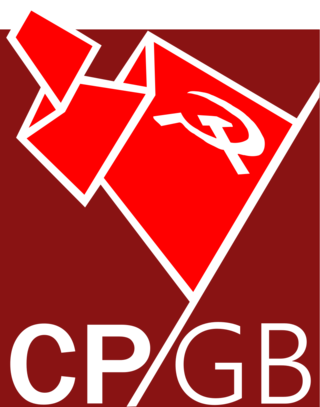
The Communist Party of Great Britain is a political group which publishes the Weekly Worker newspaper. The CPGB (PCC) claims to have "an internationalist duty to uphold the principle, 'One state, one party'. To the extent that the European Union becomes a state then that necessitates EU-wide trade unions and a Communist Party of the EU". In addition, it is in favour of the unification of the entire working class under a new Communist International. It is not to be confused with the former Communist Party of Great Britain, the Communist Party of Great Britain (Marxist–Leninist), or the current Communist Party of Britain.
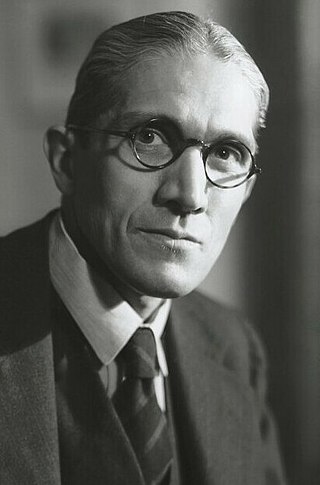
Rajani Palme Dutt, generally known as R. Palme Dutt, was a leading journalist and theoretician in the Communist Party of Great Britain, and briefly served as its fourth general secretary during World War II from October 1939 to June 1941. His classic book India Today heralded the Marxist approach in Indian historiography.

The New Communist Party of Britain is an anti-revisionist Marxist–Leninist communist party in Britain. The origins of the NCP lie in the Communist Party of Great Britain from which it split in 1977. The organisation takes an anti-revisionist stance on Marxist–Leninism and is opposed to Eurocommunism. After the fall of the Soviet Union the party was one of two original British signatories to the Pyongyang Declaration in 1992. It publishes a newspaper named The New Worker.
Britain's Road to Socialism is the programme of the Communist Party of Britain, and is adhered to by the Young Communist League and the editors of the Morning Star newspaper.
Maurice Herbert Dobb was an English economist at Cambridge University and a Fellow of Trinity College, Cambridge. He is remembered as one of the pre-eminent Marxist economists of the 20th century. Dobb was highly influential outside of economics, having helped to establish the Communist Party Historians Group which developed social history and attracted future members of the Cambridge Five to Marxism in the 1930s.

Harpal Brar is an Indian communist politician, writer and businessman, based in the United Kingdom. He is the founder and former chairman of the Communist Party of Great Britain (Marxist–Leninist), a role from which he stood down in 2018.
In Marxism, ultra-leftism encompasses a broad spectrum of revolutionary communist currents that are generally Marxist and frequently anti-Leninist in perspective. Ultra-leftism distinguishes itself from other left-wing currents through its rejection of electoralism, trade unionism, and national liberation. The term is sometimes used as a synonym of left communism. "Ultra-left" is also commonly used as a pejorative by Marxist–Leninists and Trotskyists to refer to extreme or uncompromising Marxist sects.
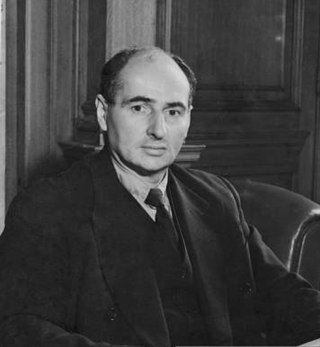
Evelyn John St Loe Strachey was a British Labour politician and writer.

Shapurji Dorabji Saklatvala was a communist activist and British politician of Indian Parsi heritage. He was the first person of Indian heritage to become a British Member of Parliament (MP) for the UK Labour Party and was also among the few members of the Communist Party of Great Britain (CPGB) to serve as an MP.
Roger Simon, 2nd Baron Simon of Wythenshawe was a British solicitor and left wing journalist and political activist. He was one of the founders of the Campaign for Nuclear Disarmament.

Ralph Winston Fox was a British revolutionary, journalist, novelist, and historian, best remembered as a biographer of Lenin and Genghis Khan. Fox was one of the best-known members of the Communist Party of Great Britain (CPGB) to be killed in Spain fighting against the Nationalists in the Spanish Civil War.

Thomas Alfred Jackson was a founding member of the Socialist Party of Great Britain and later the Communist Party of Great Britain. He was a leading communist activist and newspaper editor and worked variously as a party functionary and a freelance lecturer.

William Paul (1884–1958) was a British socialist politician.

John Ross Campbell was a British communist activist and newspaper editor. Campbell was a co-founder of the Communist Party of Great Britain and briefly served as its second leader from July 1928 to July 1929. He is best remembered as the principal in the Campbell Case. In 1924, Campbell was charged under the Incitement to Mutiny Act for an article published in the paper Workers' Weekly. Campbell called on British soldiers to "let it be known that, neither in the class war nor in a military war, will you turn your guns on your fellow workers, but instead will line up with your fellow workers in an attack upon the exploiters and capitalists." He was sentenced to six months in prison.

The Communist Party of Britain (CPB) is a communist party in Great Britain which emerged from a dispute between Eurocommunists and Marxist-Leninists in the Communist Party of Great Britain in 1988. It follows Marxist-Leninist theory and supports what it regards as existing socialist states, and has fraternal relationships with the ruling parties in Cuba, China, Laos, and Vietnam. It is affiliated nationally to the Cuba Solidarity Campaign and the Venezuela Solidarity Campaign. It is a member of the International Meeting of Communist and Workers' Parties, together with 117 other political parties. After the fall of the Soviet Union, the party was one of two original British signatories to the Pyongyang Declaration.

Eric John Ernest Hobsbawm was a British historian of the rise of industrial capitalism, socialism and nationalism. His best-known works include his tetralogy about what he called the "long 19th century" and the "short 20th century", and an edited volume that introduced the influential idea of "invented traditions". A life-long Marxist, his socio-political convictions influenced the character of his work.
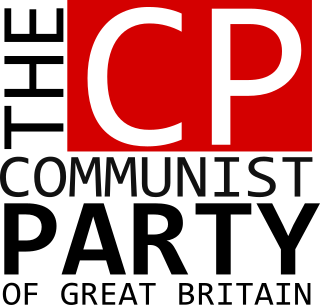
The Communist Party of Great Britain (CPGB) was the largest communist organisation in Britain and was founded in 1920 through a merger of several smaller Marxist groups. Many miners joined the CPGB in the 1926 general strike. In 1930, the CPGB founded the Daily Worker. In 1936, members of the party were present at the Battle of Cable Street, helping organise resistance against the British Union of Fascists. In the Spanish Civil War, the CPGB worked with the USSR to create the British Battalion of the International Brigades, which party activist Bill Alexander commanded.
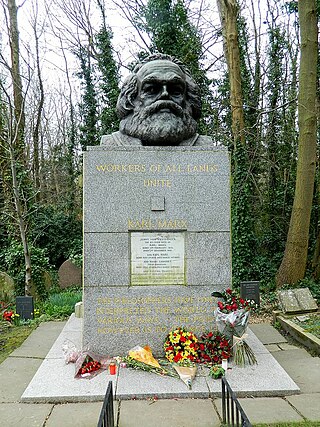
Far-left politics in the United Kingdom have existed since at least the 1840s, with the formation of various organisations following ideologies such as Marxism, revolutionary socialism, communism, anarchism and syndicalism.

Benjamin Francis Bradley (1898–1957) was a leading British communist and trade unionist who was accused of attempting to overthrow the British colonial authorities in India, leading to him being sentenced in the Meerut Conspiracy Trial. His imprisonment in 1929 provoked an enormous outcry, and in Britain, according to Stephen Howe, "probably inspired more left-wing pamphlet literature than any other colonial issue between the wars". He was also a key member of the Communist Party of Great Britain (CPGB).
Margaret Elinor Burns was a British communist, co-operative activist and suffragist.
References
- 1 2 3 4 5 "Emile Burns". Compendium of Communist Biography. Retrieved 3 April 2019.
- 1 2 3 Burns, Marca (2000). Marca's Memories, a document written by Marca Burns in her later years and circulated at her memorial.
- ↑ Stevenson, Graham. "Elinor Burns". Compendium of Communist Biography. Archived from the original on 2 April 2019. Retrieved 2 April 2019.
- 1 2 3 McIlroy, John; Morgan, Kevin; Campbell, Alan (2001). Party People, Communist Lives. London: Lawrence and Wishart. p. 240. ISBN 085315936X.
- 1 2 3 "Emile Burns: Marxist scholar". The Times. 9 February 1972.